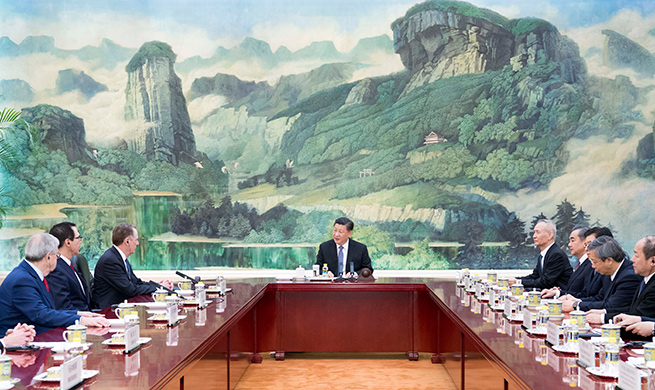LONDON, Feb. 18 (Xinhua) -- British lawmakers accused Facebook of "intentionally and knowingly" violating data privacy and anti-competition laws as they call for tighter regulation of tech companies and social media sites, according to a report released on Monday.
The report, centered on disinformation and fake news and published by the Digital, Culture, Media and Sport Committee of the British House of Commons, called for writing into law a compulsory code of ethics for tech companies. It suggested that an independent regulator be set up to oversee tech companies with powers to launch legal action against those breaching the code.
As part of its 18-month investigation, the committee scrutinized the business practices of Facebook before, during and after the Cambridge Analytica data breach scandal and accused the tech company of continuing to choose profit over data privacy. The former British consulting firm was accused of illegally accessing the data of more than 87 million Facebook users without their prior knowledge.
After studying documents related to a Californian court case brought by app developer Six4Three against Facebook, the committee said it has found evidence to indicate that Facebook was willing to charge high prices in advertising to some developers for the exchange of data, and starve some others of that data.
"Even if Mark Zuckerberg doesn't believe he is accountable to the UK Parliament, he is to the billions of Facebook users across the world," said Damian Collins, chair of the committee, adding that the CEO of the tech giant has refused to respond to the committee's invitations directly or sent representatives without the right information.
The committee also stated that social media companies are obliged to take down known sources of harmful content, including proven sources of disinformation. "Social media companies cannot hide behind the claim of being merely a 'platform' and maintain that they have no responsibility themselves in regulating the content of their sites," it said.
It also noted that current electoral law is not fit for purpose in failing to reflect online micro-targeted campaigning, and called for absolute transparency of political campaigning with clear banners on all paid-for political advertisements and videos, identifying the source and the advertiser.
The British parliamentary committee also called for explicit legislation on the illegal influencing of British politics by foreign players and urged the government to address the issue in its forthcoming White Paper on online harms.














